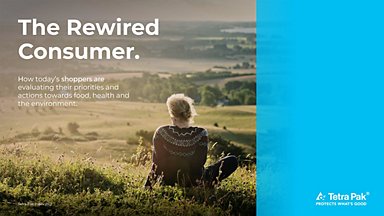Personalised health
Consumers generally want more control over their health and believe they should do more to look after themselves physically. Many trends in this year’s Index are linked to this, from interest in immunity-boosting solutions to exercise to home cooking, which gives greater control over ingredients and is perceived as healthier.
“Modern consumers are transitioning away from a reactive approach to proactively improving their holistic health and taking a more personalised approach to optimising both their physical and emotional wellbeing,” says Ana Ferrell, VP & Head of Marketing, ADM, North America.
Consumers generally want more control over their health and believe they should do more to look after themselves physically. Many trends in this year’s Index are linked to this, from interest in immunity-boosting solutions to exercise to home cooking, which gives greater control over ingredients and is perceived as healthier. So too is growing experimentation with diets, such as vegetarianism, veganism and intermittent fasting – often based on information from non-traditional sources, such as social media/influencers.
Consumers are paying more attention to the ingredients in what they eat. Consumers in our ethnographic study say they are reading food labels and checking nutritional advice more to check for health-related product attributes, such as natural ingredients, low fat or sugar, and “free from”. In the USA, shoppers looking to avoid allergens in food spend more than average on groceries – and around $19 billion a year avoiding categories or substituting products – and that number is likely to keep rising.
Consumers want more control over decisions about their health. During the pandemic, they learned to take a more active role in their own healthcare as physical access to professionals became more challenging. “During COVID, traffic on our Good Doctor platform [now Ping An Health, the #1 mobile healthcare app in China] increased more than eight times; people didn’t want to go to hospitals,” says Jessica Tan, Group Executive Director of Ping An. “This has changed … the consumer mindset. They no longer feel the need to go to hospitals for minor illnesses.”
Looking to the future, Anna Pione of McKinsey expects “a lot more offerings that let consumers triage any medical issues and take care of things mostly by themselves, so they’d only bring in a doctor when it’s absolutely necessary.”
Opportunity – A better me
There is a cohort of consumers who are treating the pandemic as an opportunity to transform themselves for the better, including working out more and being more attentive to self-care. More than a third of respondents (38%) say they are exercising more since the pandemic, while digital exercise apps have surged. For example, Strava, which allows users to share and compare as well as log their running and cycling activities, added two million users a month in 2020 and now has 76 million users worldwide.
There is a clear opportunity for products to support these self-improvers. A better me rates as the #2 increased occasion occurrence in our Demand Space study, up more than 50% since the start of the pandemic. This occasion focuses on helping the consumer make the most of their exercise, refuel and stay motivated – as well as making them feel and look good. Functional benefits include helping muscle gain and slimming, while the key emotional benefit is “to take special care of myself and my body”.


